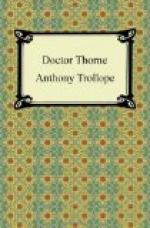Mr Nearthewinde had other elections to attend to, and had not been remaining at Courcy Castle ever since the coming of Miss Dunstable: but he had been there, and at Barchester, as often as possible, and Mr Moffat was made greatly uneasy by reflecting how very high the bill would be.
The two parties had outdone each other in the loudness of their assertions, that each would on his side conduct the election in strict conformity to law. There was to be no bribery. Bribery! who indeed in these days would dare to bribe; to give absolute money for an absolute vote, and pay for such an article in downright palpable sovereigns? No. Purity was much too rampant for that, and the means of detection too well understood. But purity was to be carried much further than this. There should be no treating; no hiring of two hundred votes to act as messengers at twenty shillings a day in looking up some four hundred other voters; no bands were to be paid for; no carriages furnished; no ribbons supplied. British voters were to vote, if vote they would, for the love and respect they bore to their chosen candidate. If so actuated, they would not vote, they might stay away; no other inducement would be offered.
So much was said loudly—very loudly—by each party; but, nevertheless, Mr Moffat, early in these election days, began to have some misgivings about the bill. The proclaimed arrangement had been one exactly suitable to his taste; for Mr Moffat loved his money. He was a man in whose breast the ambition of being great in the world, and of joining himself to aristocratic people was continually at war with the great cost which such tastes occasioned. His last election had not been a cheap triumph. In one way or another money had been dragged from him for purposes which had been to his mind unintelligible; and when, about the middle of his first session, he had, with much grumbling, settled all demands, he had questioned with himself whether his whistle was worth its cost.
He was therefore a great stickler for purity of election; although, had he considered the matter, he should have known that with him money was his only passport into that Elysium in which he had now lived for two years. He probably did not consider it; for when, in those canvassing days immediately preceding the election, he had seen that all the beer-houses were open, and half the population was drunk, he had asked Mr Nearthewinde whether this violation of the treaty was taking place only on the part of the opponent, and whether, in such case, it would not by duly noticed with a view to a possible petition.
Mr Nearthewinde assured him triumphantly that half at least of the wallowing swine were his own especial friends; and that somewhat more than half of the publicans of the town were eagerly engaged in fighting his, Mr Moffat’s battle. Mr Moffat groaned, and would have expostulated had Mr Nearthewinde been willing to hear him. But that gentleman’s services had been put into requisition by Lord De Courcy rather than by the candidate. For the candidate he cared but little. To pay the bill would be enough for him. He, Mr Nearthewinde, was doing his business as he well knew how to do it; and it was not likely that he should submit to be lectured by such as Mr Moffat on a trumpery score of expense.




